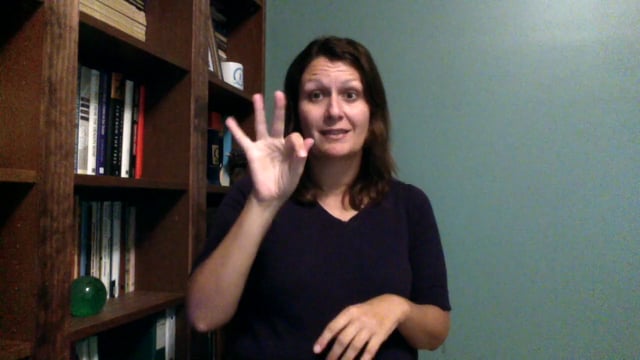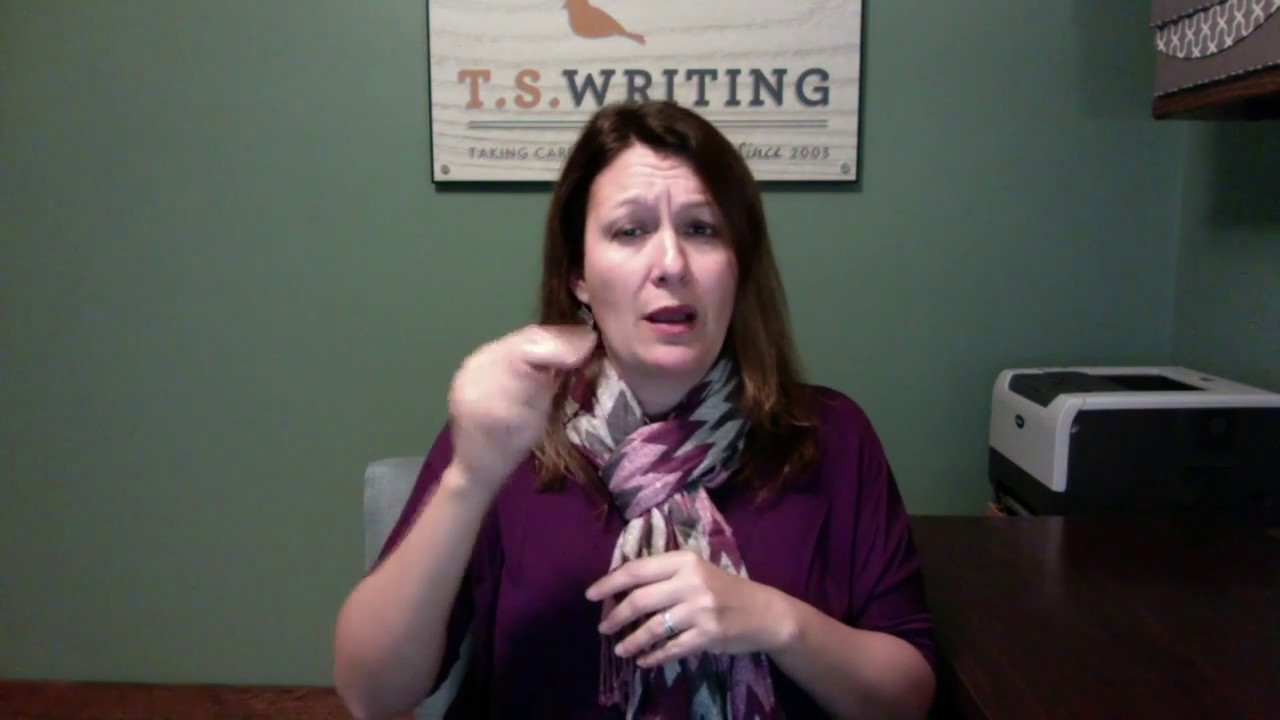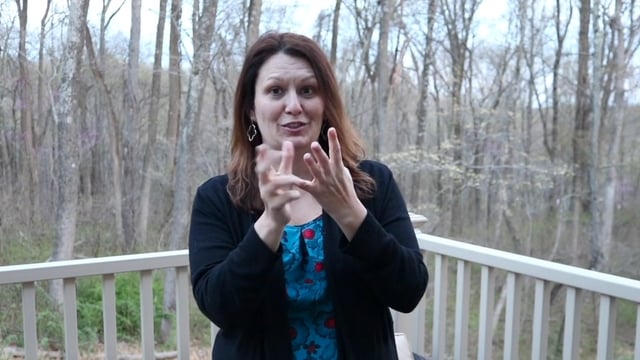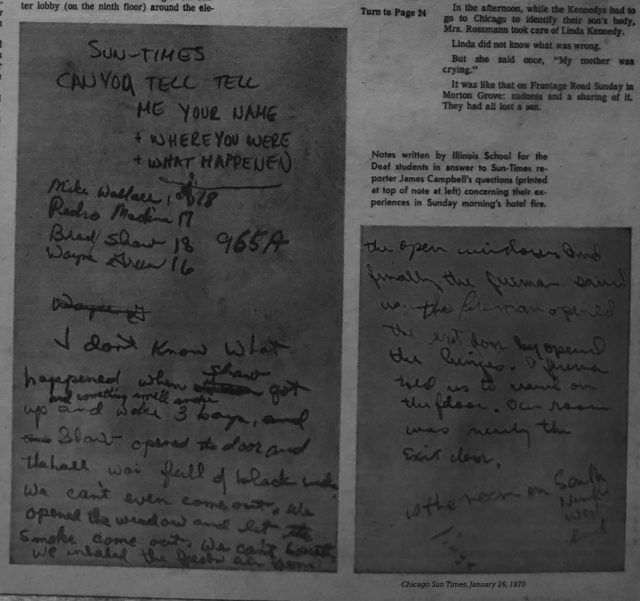Video description: Trudy Suggs, a white woman with brown shoulder-length hair, is wearing a purple v-necked sweater that ties at the neckline. She is seated in a corner with brown bookshelves on her right and a sea blue wall on her left.
One of my favorite teachers, Barbara Turner, found an October 1990 letter I wrote to Silent News, a newspaper I later served as editor of for two years. As I re-read the letter (found at the end of this article), I was struck by what I wrote back then, especially given that I was only 15 years old.
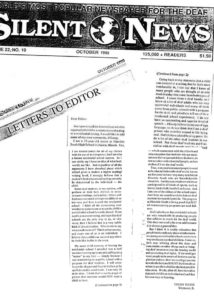 In 1990, I was deep in the trenches of what was then a deeply emotional discussion taking place everywhere. I remember sitting down in frustration after reading a few articles in Silent News, and pecking away on my electric typewriter. My perspectives stemmed from what I saw on a day-in, day-out basis. Today, I have mixed feelings about what I wrote (especially some of my word choices), although I do staunchly believe, as I did 26 years ago, that “a student’s best educational setting can only be determined by the individual — the child.”
In 1990, I was deep in the trenches of what was then a deeply emotional discussion taking place everywhere. I remember sitting down in frustration after reading a few articles in Silent News, and pecking away on my electric typewriter. My perspectives stemmed from what I saw on a day-in, day-out basis. Today, I have mixed feelings about what I wrote (especially some of my word choices), although I do staunchly believe, as I did 26 years ago, that “a student’s best educational setting can only be determined by the individual — the child.”
I’ve also come to understand so much more about the mainstreaming versus deaf school controversy, and I’ve watched the pendulum swing back and forth. I’ve recognized that one of the challenges is ensuring that each family has full awareness of all the consequences of either choice. Most importantly, I’ve become a mother to four deaf children.
Looking back, I realize now just how oppressive many of the teachers were towards us Deaf students, except for Ms. Turner, in terms of audism, linguicism, and the most basic of respect. To be fair, that was the norm back then and still is the norm at so many schools today. This oppressive attitude spilled over into our daily perspectives of ourselves; I’ve written extensively about how I struggled with my self-esteem and identity because of these teachers. It’s bittersweet to think of how Deaf students, including me, thought we were “lucky” to be mainstreamed when in reality, this was dysconscious audism at its finest. We simply were indoctrinated to believe that hearing was better.
With that said, I was so fortunate to have had access to a Deaf family, the Deaf community, publications like Silent News and Deaf Life, and most importantly, Deaf friends and role models. My classmates didn’t necessarily have this same access, except through the three deaf families at my school. After all, the nearest deaf school was about four to five hours away. The school we attended didn’t really expose us to deaf role models on a consistent basis, although we did have guest speakers and attended a very few events with deaf students from other schools.
Let’s take a quick look at some of what I wrote.
“Some deaf students, in my opinion, will perform at their best abilities in mainstreamed settings, such as I do.”
Actually, I sucked at school. I was never a great student, and I never felt as if I was academically or even personally smart. I would struggle in class, trying to understand why I couldn’t follow along. I had to put up with teachers’ scorn, because they had higher expectations of me given that my papers said I was gifted and had skipped two grades at another public school. Today I realize I struggled because the interpreters weren’t qualified for the most part, and I didn’t have direct communication access. I had attended a deaf school for a year, but it wasn’t the best option at the time; also, my mother got remarried and we relocated to the Chicago area. Even though I was one of those students who participated in a million extracurricular activities and had a lot of hearing friends and even a hearing boyfriend, I never felt as if I really fit in. In between classes and after school, I would always run to my deaf friends and drink up every minute with them.
If I could do it all over again, I would probably have requested better interpreters, or perhaps homeschooling — or found a way to go to a deaf school again. Even with the best interpreters, the access still would not be equivalent to the access at deaf schools.
“I think all the controversy over whether to mainstream or to put a child in a residential school is overly absurd. . .
But I think it is totally ridiculous that people battle endlessly . . . Come on, let’s stop whining about this issue and concentrate on other things such as bringing deaf awareness into the hearing world and promoting deaf rights.”
Yikes. “Absurd,” “ridiculous,” and “whining” aren’t words I’d use nowadays. The controversy, which persists to this day especially in light of so many deaf schools closing, is a very serious topic — especially given the dramatic increase in solitary mainstreaming of deaf children. Even so, I thought, and still believe, that this controversy is putting the horse before the cart. The more pressing issue is ensuring that every child has access in the form of sign language along with whatever other communication mode(s) are accessible, and that every family has full information and is fully educated and aware of the importance of cultural and linguistic access in all aspects of the child’s life. Only when this has been achieved can we focus on educational options.
“Going back to my statement that a child can succeed in a setting that he feels most comfortable in, I can say that I know of many people who are thought of as role models today that come from both types of school. . .I do have a lot of hearing peers. So do a lot of the other deaf students in my school. But those deaf students and I socialize with deaf people outside of school — which counteracts with the often-found misconception that students who are mainstreamed are not proud of their deafness, do not socialize with other deaf people, and are sheltered from the deaf world.”
I still agree, but I also recognize that even with the oppression students at my school faced, we still had access to resources that are not available to many deaf mainstreamed students, such as direct instruction in ASL, Deaf-centric extracurricular activities, and even books and publications about ASL and Deaf people. Unfortunately, it’s even more of a fact today that so many mainstreamed students do not have access to or awareness of the Deaf community.
My high school also had a critical mass of deaf students — about 80 — as opposed to only 5 or 10 students. This was imperative, because it enabled us to have our own sub-groups, our own culture, and even our own vocabulary (just ask me how we signed “fump” or “gross”). The most important thing is that we developed a network among ourselves, and through the deaf families and extracurricular activities at school found other deaf people. Even so, this critical mass is nothing like the one I see at my children’s school nowadays, and I now fully realize just how much I missed out on.
“And I also know that residential schools are very remarkable in producing people that achieve so much for the deaf world. This does not need to be even said because it is almost a granted fact.”
Unfortunately, we do have to say this, because residential — or rather, Deaf schools — have gotten such a bad rap especially in the past 50 years. We need to go back to basics, and recognize that many people’s ideas of what deaf schools offer are often outdated and rooted in the outdated concept of “institutionalization.” Many Deaf schools offer a variety of programs and services, including audiology and spoken language, and offer comprehensive education. It’s also imperative to recognize that most of the community leaders in our storied Deaf history came from deaf schools, and that many community leaders also come from deaf schools. For example, the receptionist at the White House, Leah Katz-Hernandez, attended a deaf school. Claudia Gordon, a White House lawyer, attended a deaf school. Nyle DiMarco, the hottest star to hit Hollywood, graduated from a deaf school. The recent chair of the FCC disability office, who left the position a few weeks ago, Greg Hlibok, also comes from a deaf school. The list goes on and on.
Nowadays, that demographic may be changing — through no fault of our own. With mainstreaming forced upon more deaf students as a result of an increased reliance on technology, the closing of Deaf schools, dissemination of naccurate information, and a general lack of resources in many parts of the country, more and more community leaders will come from mainstreamed settings. Some of them have or will become successful leaders if they have tremendous resources and support at home; others will probably struggle with all the same issues of fitting in, self-esteem, language barriers, trying to do what others expect of them —on top of normal development challenges such as puberty and socialization. So it’s important for us to continue identifying successful people who have happily embraced the Deaf community and its culture, heritage, and language.
“If we could get more people to be aware of deafness and its glorious culture, then we could get parents to make the best and RIGHT decision about where to put their child for the best possible education. We do, after all, have to realize that each child is an individual and each has his own way of learning.”
Even as passionate as I am about the importance of Deaf schools and reviving the critical masses that once existed at every Deaf school, I still believe that each child has to have choices. If we could bring Deaf school numbers back to what exists at schools like Maryland, Texas, and Indiana, we’d have choices at each and every Deaf school instead of “resorting” to mainstreaming as a choice. By choices, I mean choices in educational methods, communication modes, services, courses, social circles, and so much more. Every child should have access to these choices without having to sacrifice full, complete, direct access to education and every aspect of school — especially socialization and world knowledge.
I will say this, though, as a final statement: many of my fellow Deaf students at Hinsdale South High School went on to have Deaf children. The majority of us, including me, have chosen to enroll our children at deaf schools. This alone speaks volumes.
Letter to Silent News Editor, October 1990
Dear Editor:
In response to all the letters about whether to put a deaf child in a mainstreamed setting or a residential setting, I would like to add some of my own comments, if I may.
I am a 15-year-old senior at Hinsdale South High School in Darien, Illinois. Yes, I am mainstreamed for all of my classes with the use of an interpreter, but I am also a former residential school student. So I can safely say I have an idea of what both worlds are like. And regardless of all the arguments I have absorbed about which school gives a student a higher reading/writing level, I strongly believe that a student’s best educational setting can only be determined by the individual — the child.
Some deaf students, in my opinion, will perform at their best abilities in mainstreamed settings, such as I do. Others will find mainstreamed settings too difficult or too easy and lean toward the residential school. I think all the controversy over whether to mainstream or to put a child in a residential school is overly absurd. If one scoffs at mainstreaming and says that deaf schools are the only way to go, or vice versa, then I believe that is a very subtle kind of discrimination. Who is one to say what another can do? This is a free country, and every one of us is an individual. I believe that a child can succeed anywhere he feels like he fits in the most.
My most vivid memory of leaving the residential school I attended was a staff member coming up to me and calling me a “traitor” to my face — simply because I was transferring to a public school with a program for deaf students. I will never forget the disgust and fury in his face as he spelled out that word to me. I was only 10 at the time. I think that’s exactly the type of picture that someone would NOT want a child to have.
Going back to my statement that a child can succeed in a setting that he feels most comfortable in, I can say that I know of many people who are thought of as role models today that come from both types of school. I come from a deaf family; so I know a lot of deaf adults who are very successful individuals and many of them come from public schools with a program for the deaf; and yet others tell me of their residential school experiences. I do not have an outstanding and superior level of speech — I firmly believe in the use of sign language, so do not think that I am a deaf person who marches around in life being oral. But I do have a lot of hearing peers. So do a lot of the other deaf students in my school. But those deaf students and I socialize with deaf people outside of school — which counteracts with the often-found misconception that students who are mainstreamed are not proud of their deafness, do not socialize with other deaf people, and are sheltered from the deaf world.
True, many mainstreamed people do need to be educated about the deaf world, but we are fortunate to have very many teachers at Hinsdale South who are knowledgeable about this. And there are students who have participated in all kinds of sports, such as soccer, basketball, baseball, and so on. And I am one of the editors of the school paper. And there are countless clubs that our deaf students have participated in. The program at Hinsdale South is living proof that NOT all mainstreaming programs are total failures.
And I also know that residential schools are very remarkable in producing people that achieve so much for the deaf world. This does not need to be even said because it is almost a granted fact.
But I think it is totally ridiculous that people battle endlessly about whether mainstreaming or residential schools are the best way to educate our deaf children. Come on, let’s stop whining about this issue and concentrate on other things such as bringing deaf awareness into the hearing world and promoting deaf rights. If we could get more people to be aware of deafness and its glorious culture, then we could get parents to make the best and RIGHT decision about where to put their child for the best possible education. We do, after all, have to realize that each child is an individual and each has his own way of learning.
Trudy Suggs
Westmont, IL
This article can not be copied, reproduced, or redistributed without the written consent of the author.

